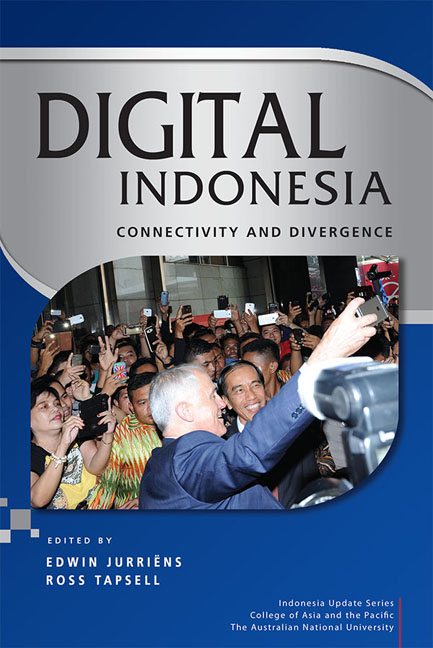1 - Challenges and opportunities of the digital ‘revolution’ in Indonesia
Published online by Cambridge University Press: 12 January 2018
Summary
Digital technology is fast becoming the core of life, work, culture and identity in Indonesia. In a young nation with a median age of 28 and a rapidly growing urban middle class, Indonesians are using digital technologies in ways that have made the world take notice. In 2016 Indonesia had 76 million Facebook users, the fourth highest number in the world. Jakarta has been named the world's ‘most active city on Twitter’ (Lipman 2012), while other platforms such as Instagram, WhatsApp, LINE, Path and Telegram are all being used in unique and dynamic ways. It is now commonplace to walk into a cafe in one of Indonesia's cities and see a group of young Indonesians all sitting in silence, eyes fixed on their mobile phones. Even outside the cities, there is voracious demand for admittance into the digital world. In research exploring the ‘improbability’ of a nation with over 13,0000 islands, a coastline of 54,000 kilometres and a population of 250 million with dozens of ethnicities, journalist Elisabeth Pisani (2014: 3) observed villagers climbing trees in order to get 2G phone reception; ‘Millions of Indonesians live on $2 a day and are on Facebook’, she wrote.
Indonesia's digital economy is an area of great potential, as shown by the rise of Go-Jek and Grab, ride-sharing companies whose success has been propelled by the ubiquitous use of smartphones. In mid-2016 Go-Jek raised $550 million in new capital, giving it a value of $1.3 billion, an incredible result given it had launched its first mobile phone application only a year and a half earlier (Pratama 2016). On the back of Go-Jek and other e-commerce successes, President Joko Widodo (Jokowi) stated that Indonesia aimed to have ‘1,000 technopreneurs’ and a digital economy worth $130 billion by 2020 (Tapsell 2015a; Wisnu 2016).
Politically, digital platforms are being used to organise mass rallies, assist with election monitoring and generally provide a space for greater freedom of opinion and expression on a variety of issues, contributing in no small way to the country's rambunctious democracy. Anyone running for political office must now consider how to engage with the world of online campaigning, in particular by nurturing a presence on social media. As this book explains, digital technologies have had a marked impact on the media industry, governance, commerce, informal sector employment, city planning, disaster relief, health, education, religion, artistic and cultural expression, and much more.
- Type
- Chapter
- Information
- Digital IndonesiaConnectivity and Divergence, pp. 1 - 18Publisher: ISEAS–Yusof Ishak InstitutePrint publication year: 2017



